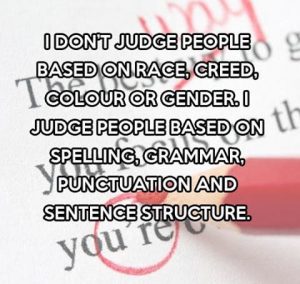CN: Ableist and otherwise problematic meme, discussion of ableism, racism, classism.
A friend from outside of my social justice circles posted the meme below on their Facebook page. The background is an image of black text on white paper, with red pen circling a the word “you’re.” The overlaying text reads: “I don’t judge people based on race, creed, colour, or gender. I judge people based on spelling, grammar, punctuation and sentence structure.”

You know, I used to do this. Then I learned that what I was often judging people on was the quality of the schools they had access to growing up (and thus their childhood socio-economic level), their learning disabilities (dyslexia etc), and whether or not formal academic English is their first language (sometimes it turns out it is AAVE, another dialect, or a foreign language). I decided I did not want to judge people based on these things anymore.
Instead, I want to decide who I respect based on their values. One of my values is trying to recognize the ways in which my thinking oppresses other people, and trying to change my thinking to be less hurtful to people.
Ironically, as this meme is claiming to be a statement against racism and sexism, it has the risk of perpetuating racism in less blatant ways. Racism is not just judging people for their skin color – it also involves treating things that you associate with non-white people as bad. Judging people for using AAVE is racist. Judging people who speak and write more than one language, however imperfectly, is racist. Subtle racism, displayed in disdain for different communication styles, is racist and this meme perpetuates it.
Ableism is still one of those things that people don’t even think of when they create a list of prejudices they don’t want to hold. When this is pointed out, they will often recognize that they don’t want to judge people with physical disabilities, and further pressed they will recognize the need for empathy towards people with profound mental disabilities. But this work on lack of judgement rarely goes as far as recognizing the ways in which our biases may harm people with learning impairments, less visible disabilities, and mental illness.
I had access to pretty good schools growing up, and was taught formal grammar in classrooms that were mostly safe and mostly reasonably well funded. Not everyone has access to the kinds of schools I did. I have been inside schools that are not safe, that are not funded, and that are incredibly difficult to learn in. I had class on my side growing up, and not everyone did. This meme illustrates the classism that judges people for the access they have had.
I want my ideas to be understood by readers, so I make an effort to write in the clearest way that I know how. Often, but not always, this involves using formal and semi-formal English grammar, spelling, and punctuation. This tactic works for me, but it isn’t always best. There are situations in which I will forgo these conventions for language that is more appropriate for the situation, and I’m fairly fluent in speaking Internet, which is pretty clearly its own dialect. I recognize that others will use dialects they consider appropriate to the situation, and sometimes the intended audience is not me.

